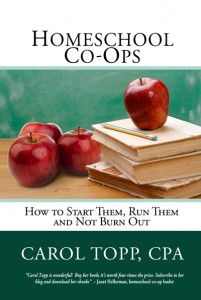
Homeschool Co-ops
How to Start Them, Run Them and not Burn Out
Have you ever thought about starting a homeschool co-op? Are you afraid it will be too much work? Do you think you’ll have to do it all by yourself? Starting a homeschool co-op can be easy! This book Homeschool Co-ops: How to Start Them, Run Them and Not Burn Out will give you ideas, inspiration, tips, wisdom and the tools you need to start a homeschool co-op, run it and not burn out!
Paperback $9.95
Ebook (pdf) $3.99
Kindle $3.99
[wptabs mode=”horizontal”]
[wptabtitle] Table of Contents[/wptabtitle]
[wptabcontent]
Part One: Starting a Homeschool Co-op
- Chapter One: Benefits of Co-ops
- Chapter Two: Disadvantages of Co-ops
- Chapter Three: Different Types of Co-ops
- Chapter Four: Your First Planning Meeting
- Chapter Five: What’s in a Name? Names, Missions
Part Two: Running a Homeschool Co-op
- Chapter Six: Leadership
- Chapter Seven: Co-op Offerings
- Chapter Eight: Money Management
- Chapter Nine: Managing Volunteers and Conflict
- Chapter Ten: Ready for the Next Step? 501c3 Tax Exempt Status
Part Three: Not Burning Out
- Chapter Eleven: Avoiding Burn out
[/wptabcontent]
[wptabtitle]About the Author[/wptabtitle]
[wptabcontent]

Carol Topp, CPA is a retired homeschool mother, accountant and author of The IRS and Your Homeschool Organization, Money Management in a Homeschool Organization and Homeschool Co-ops: How to Start Them, Run Them and Not Burn Out. Carol runs an accounting practice specializing in nonprofit accounting.
Carol has presented numerous workshops on money management, taxes, budgeting, nonprofit management and homeschooling to community, church and homeschool organizations. She is also the host of the public television show Starting a Micro Business and a podcast called Dollars and Sense on the Ultimate Homeschool Radio Network.
Her website, HomeschoolCPA.com, was awarded a Top Accounting Blog in 2014, 2015 and 2016 but her greatest compliment was from an audience member who, after sitting for 90 minutes,said , “You kept my attention the entire time.” That’s high praise for a CPA! Carol and her husband live in Cincinnati, Ohio and have two daughters, both homeschool graduates.
[/wptabcontent]
[wptabtitle]Reviews[/wptabtitle]
[wptabcontent]
Reviews
“Carol Topp is wonderful, buy her book, it’s worth 4 times the price, subscribe to her blog, download her ebooks”
-Janet Hellerman, www.CHAMPSHomeschool.com
Homeschool Co-ops is bound to make the process of starting a co-op less confusing. Mrs. Topp’s advice and checklists for applying for non-profit status are valuable for new and existing co-ops and even for homeschooling support groups.The book is particularly helpful in the chapters of Mrs. Topp’s area of expertise, financial management. The author shares much insight into organizing the co-op’s accounting, budgeting, and becoming a non profit, 501(c)3 corporation. Read the entire review here.
-Martha Robinson, HomeschoolChristian.com
Carol’s expertise in accounting, coupled with her long-time acquaintance with the home-schooling movement, has proven invaluable to our organization. I only wish I had the information presented in this book years ago when we were first starting out on this adventure!
-Mary Hood, Author of The Relaxed Homeschooler and founder of ARCHERS for the Lord, Inc (Association of Relaxed Christian Home Educators)
I first knew Carol Topp as a fellow homeschool mom in our local support group. I knew then that she was sharp, but my respect for her grew to a whole new level when years later she became my CPA! Carol comes with wisdom and understanding of the homeschool movement as well as expertise in the field of accounting. I’m glad to see Carol share her talents and experience.
-Linda Lacour Hobar, author of The Mystery of History
This insightful and practical book is a must-read for every leader (and member) of a homeschool co-op or support group. The Biblically-based guide is packed with helpful advice from experienced homeschool leaders who, like good friends, warmly share their wisdom and knowledge. It is a comprehensive resource that you will surely find yourself referring to again and again over the years.
-Teri O., New River, AZ, www.KnowledgeHouse.info
This book is a fantastic resource for every co-op. There is some wonderful advice for situations that your group may encounter. A must read for new groups or those that have been around for quite awhile!
-Kathie R., Kingdom Homeschool Association Member, Kingdom City, MO
Carol, I am halfway through our book and had to stop and tell you how much I love it!
You have done such a great job of giving information without being judgmental. I am going to tell everyone I know that homeschools to read it. We have several families at our church with young children just starting to homeschool and I know they will benefit greatly from your description of different types of co-ops.
-Pam McBride, eCoops.com Online Data Management for Teaching Co-ops
This book is a must have for any one wishing to start, maintain, or save a dying co-op.
I would have loved to have had this book years ago when I joined my first co-op. Being brand new to home schooling, the other moms and I knew nothing on how to get a co-op off the ground. We forged a path through uncharted territory, figuring it out as we went. Though we gained friendships, fellowship, and a shared learning experience, we weren’t without our struggles, personality conflicts, and growing pains. That’s when a book like this is invaluable.Anything you want to know about cooperation of families working together – small co-ops, large ones, mission statement and purpose, leadership and volunteer roles, handling conflict, potential class topic ideas, location, and even tax-exempt issues are explained. It’s all there in this well written 170-page book.
There is no stone left unturned! No matter what your need or group size, this book is a great help to start and keep your Co-op healthy.
-Kathy Davis, www.HomeschoolBuzz.com
I never think I “know it all” even though I’ve homeschooled for what feels like an eon (since 1986), yet I learned much more than I expected when I picked up the copy of Homeschool Co-ops: How to Start Them, Run Them and Not Burn Out penned by Carol Topp.
I have been in various forms of co-ops since the beginning and did take a break when my older two started high-school. Now with my younger three, I’m back into the mix and have sat in the sidelines watching as much younger mommies, with much more energy take the helm. What I have found in Carol’s book is a manual I can hand them and say, “Take a look, this is invaluable information!” She covers everything from the pitfalls to the highlights and high spots of homeschool co-ops.
I can tell you that sometimes when there are failed expectations co-ops can take a turn for the worse. Having someone at the helm who understands the process can really alleviate those problems as well as having a formalized plan if your co-op involves monetary exchanges. Whatever your point in your homeschool journey from beginning to veteran, this book is an invaluable resource and well worth a look.
I highly recommend it and will be using it with my own endeavors.
-Felice Gerwitz, Author/Publisher, www.MediaAngels.com
Are you thinking about starting a homeschool co-op? Are you involved a homeschool co-op that needs some re-structuring? Carol Topp, who is also a CPA, has written a how-to guide on how to start, run, and not burn out. As a homeschool group leader for many years, I would have benefited from this book when our group went through a major reorganization. Growing pains are never fun, but our growing pains would have been easier with this resource. This books contains space for you to answer questions, and it gives you outlines of questions to ask when structuring your co-op. This book contains 11 chapters, and one chapter that ALL homeschool co-ops should read is the one about 501(c)(3) Tax-exempt Organizations. There is a handy checklist and list of resources. I highly recommend this book for any homeschool leader or member.
-Tami Fox, Discount Homeschool Store www.dhss.com
Homeschool co-ops: They can make all the difference in your homeschool. We were members, and I helped lead, a homeschool co-op for a few years and it was a wonderful experience. We learned much, though, about what not to do, as well as what to do to make a co-op successful. Oh, how much easier those first couple of years would have been if we’d had a book like Carol Topp’s Homeschool Co-ops to guide us!
Topp comes to her topic as a voice of experience. Actually, she comes with several voices of experience as she draws from a wealth of people who have participated in and run co-ops of all sizes and formats in all parts of the country. With this great knowledge base to draw from, she offers a book that literally leads you by the hand, from the do-we-don’t-we question (Her first two chapters discuss both the positives and negatives of homeschool co-ops.), through choosing the type of co-op that will work best for you, and on into the nitty gritty details (many of which you’ll not think of on your own) of starting and running a homeschool co-op.
I cannot express in a brief review what a benefit this one book would be. I picked it up with several specific questions in mind – issues that we had to deal with in our co-op – and she addressed every single one. Topp not only presents her own information, but also leads you to more, providing several website and book suggestions that could prove invaluable. She offers a variety of suggestions (There is no one right way to run a co-op) and even goes so far as to cover ground you may not be ready to think about right now (Like whether or not you would ever want to be a 501(c)(3) and what it would entail). Finally, she addresses a topic that every leader needs to study in advance – avoiding burn out.
You’ll find helpful lists here, suggestions for questionnaires for potential co-op members, and even her own group’s list of things to consider when choosing a location. Trust me, if you are seriously considering starting a homeschool co-op, or even taking a leadership role in an existing co-op, you need to read this book. It could save you much time and money and many a heartache in months and even years to come.
-Tammy Cardwell, Eclectic Homeschool Online https://eclectichomeschool.org/
While I have never been a member of a co-op, I was thinking about getting together with one or two other families to have either an art class or science class– the two subjects that have sadly fallen by the wayside in our homeschool. Carol’s book came at the perfect time! Let me tell you some of my favorite things about her book:
* Carol’s writing style is very easy to read. It didn’t take extra energy (that I did not have) to just get through the book– I actually enjoyed reading it!
* Included in her book are real life stories and situations. Not only does it make things more interesting, but you can tell the book contains her personal experience with co-op’s along with the experience of other homeschoolers.
* As you would expect from a CPA, the book is very well organized. Nothing irks me more than a book with no flow and no sense in the order of chapters.
* Examples of various forms, mission statements, etc. are included. She also has very pointed questions to ask yourself in each chapter. Not one to just convince you that a co-op is for everyone, Carol helps you to see the many benefits of a co-op as well as to count the cost.I highly recommend this book to anyone that has even thought about starting a co-op! This has encouraged me greatly and I plan to pass this useful resource on to others.
-Marsha Drews, Homeschooling mother in Texas
The opening chapters of Homeschool Co-ops provide a levelheaded assessment of both advantages and disadvantages of participating in a co-op. Topp addresses general issues including the double-edged nature of co-op distinctives, as well as specific matters including how to evaluate space and facilities. Valuable checklists, surveys, and links support the author’s recommendations. Quick references sprinkled throughout the text direct readers who seek more in-depth coverage of a topic discussed. Sometimes readers are directed to another chapter within the text, other times they are referred to an outside source, website, or book. Detailed suggestions for co-op offerings are provided, including classes and activities based upon students’ ages, topics, clubs, or curriculum. As a fellow writer, I particularly appreciate her admonishment for homeschoolers to purchase curriculum whenever photocopying violates copyright restrictions.
Although insights from others who have led or participated in co-ops are valuable, one of this book’s greatest strengths comes from Carol’s insight as a CPA with personal experience in home school co-op business matters. Carol presents clear explanations regarding the various non-profit organizational structures and by-laws. She explains how to prepare a budget, bookkeeping basics, and the benefits and disadvantages of the coveted 501(c)(3) status. A more detailed treatment of these matters as well as guidelines regarding hiring teachers and other employees may be found in her eBook titled, Money Management for Homeschool Organizations (see her website for ordering details).
In the last section of her manuscript, she underscores an obvious but too often neglected reality: a co-op is not a solo venture! Fortunately, she provides concise instructions on how to avoid burn out: “Strive for a co-op that lives up to its name…” Carol closes her counsel with the ABC’s of successful homeschool co-ops: “A Board” (establish one), “Bylaws” (write them, and include a clear mission statement), and “Create a Budget.”
In summary, this title brims with wise counsel and practical resources for those who lead or attend or are simply considering participating in a homeschool co-op.
-Stacy Farrell, homeschool mother https://www.homeschooladventure.com
[/wptabcontent]
[/wptabs]

[…] Book ~ Homeschool Co-ops, How to Start Them, Run Tem and Not Burn Out […]
[…] Homeschool Co-ops: How to Start Them, Run Them, and Not Burn Out – This book is the most comprehensive resource I’ve seen on starting your own co-op. It’s for serious co-op starters! Legal implications, forms, this book has it all. […]
[…] re-read the chapter on co-oping in Debra Bell’s Ultimate Guide to Homeschooling. Now there is Carol Topp’s e-book, and a facebook group for […]